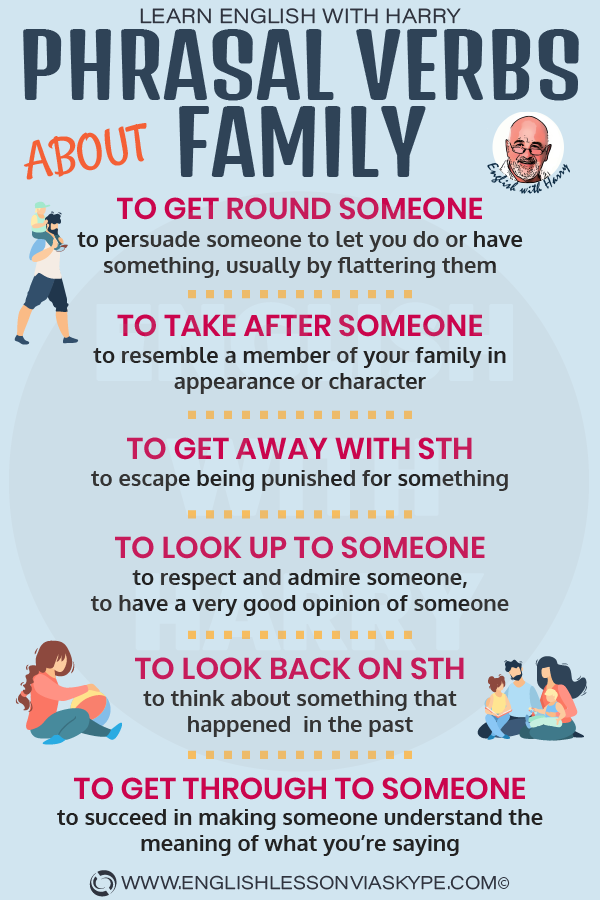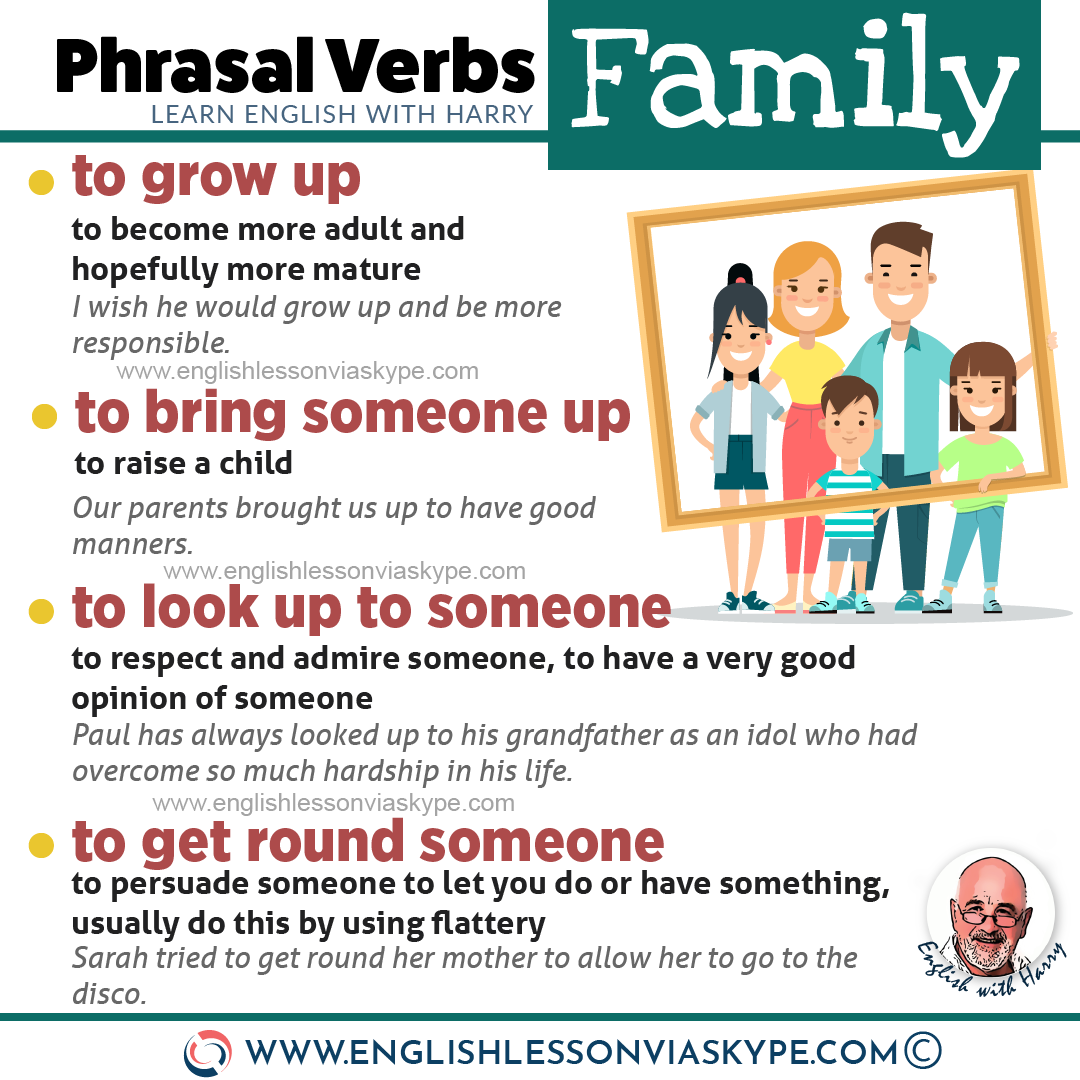Here you will learn useful phrasal verbs related to the family.
To look up to someone, to take after someone, to get round someone meaning and more.
Listen to this episode on Speak Better English podcast.
speak better English with Harry - Episode 152
list of family phrasal verbs
Harry
Phrasal Verbs related to the Family

Share! Help other students to improve English skills.
Hi there, this is Harry and welcome to the podcasts where I try to help you understand English a little better so you can be so you’re able to talk, communicate, and make that communication effective with native and non native speakers. So, we all do this with the help of some podcasts and today’s podcast, hopefully is no exception.
We’re going to look at phrasal verbs related to the family. Useful English epxressions that you need to know about parents and children. So let’s start.
Intermediate to Advanced English Marathon

INSANITY: doing the same thing over and over again and expecting different results.
Albert Einstein
- What you'll learn:
- better understanding of more complex grammar structures
- advanced English vocabulary words
- British & American slang
- perfect your listening skills through practing different accents
- This marathon is for you if you're:
- stuck at an intermediate English level
- tired of confusing explanations
- a mature student
- shy & introverted
Phrasal Verbs related to the Family
to get round someone
Meaning: to persuade someone to let you do or have something, usually do this by using flattery
For example:
You want to borrow the family car and you try to get round your father by telling him that he’s great, he’s wonderful, he’s the best father in the world.
Sarah tried to get round her mother to allow her to go to the disco.
to take after someone
Meaning: to resemble a member of your family, both in appearance and character or just an appearance or just in your character
For example:
When children are born, we immediately want to try and identify which member of the family they most take after.
You took after your father. = You’re just like your father.
You took after your mother. = You look like your mother.
You took after your grandmother. = You resemble your grandmother.
Phrasal Verbs related to the Family
to tell someone off (for doing something)
Meaning: to reprimand, usually a child, to speak to them severely because they have done something that they shouldn’t have done
For example:
Peter played football in the house and damaged the front window. Mum was very cross and told him off for doing that.
to look up to someone
Meaning: to respect and admire someone, to have a very good opinion of them, to listen to what they say or to seek them out to get their opinion on what we should do, perhaps in our career
For example:
Paul has always looked up to his grandfather as an idol who had overcome so much hardship in his life.
Phrasal Verbs related to the Family

Share! Help other students to improve English skills.
to bring someone up
Meaning: to raise a child, to look after that child until they are an adult, and where they can look after themselves, and to try and instil in them some particular beliefs, attitudes, and approaches to life to make them a better person.
For example:
Our parents brought us up to have good manners.
to get out of doing something
Meaning: to avoid having to do something
For example:
At the beginning of the year, a lot of kids tried to get out of doing their homework.
to get through to someone
Meaning: to make someone understand or to succeed in making someone understand exactly what you mean
For example:
We try to tell our children what they should do, but sometimes we just can’t get through to them.
I just can’t get through to that child. = I have a problem trying to get the child to understand exactly what I want.
We often use it in the negative:
I just can’t get through to him.
I wish I could get through to him. = I wish I could make him understand.
Phrasal Verbs related to the Family
to grow up
Meaning: to become more adult and hopefully more mature
For example:
I wish he would grow up and be more responsible.
to get away with something
Meaning: to escape being punished for something that you did
For example:
I came in late last but thankfully everyone was asleep I think I got away with it.
to look back on something
Meaning: to reflect on how our life was and how things turned out, to think about something that happened in the past
For example:
People often look back on their school days as being the happiest days of their lives.
So there are our phrasal verbs related to the family. Hopefully, you’ve enjoyed that. And as always, if you wish to contact me, I’m always happy to get your feedback.
Thank you for listening. Join me again soon.

improve english on a budget
Online English Courses from €7.99
More information
For more information on English grammar rules, English collocations and English idioms, check out the links below:
English expressions with LOOK
English collocations with EDUCATION
You will love these English lessons

English Idioms Related To Technology
Learn idioms related to technology. Here I have 10 interesting English idioms that are connected with technology. Nuts and bolts.


20 Advanced Adjectives To Describe People
Learn 20 advanced adjectives to describe people. Enhance your English and sound like a native with 20 C1 & C2


13 English Idioms about Buildings
There are more parts to a building than just the walls. Here are some more commonly used English idioms about



to cajole = to get round to someone? Thank you very mauch.
Correct, these are synonyms